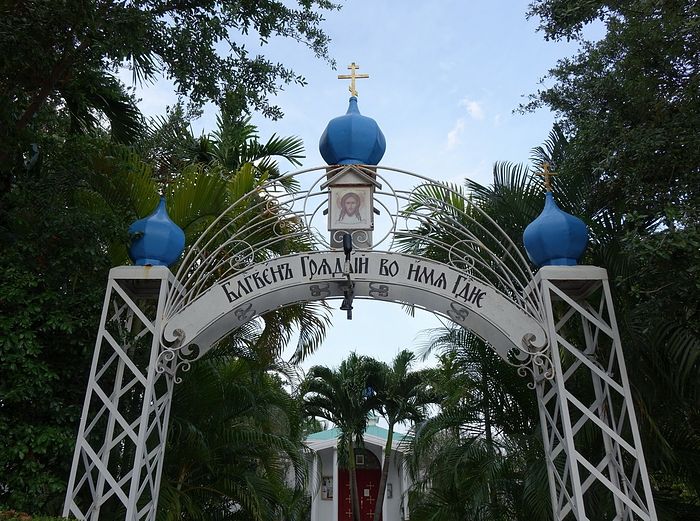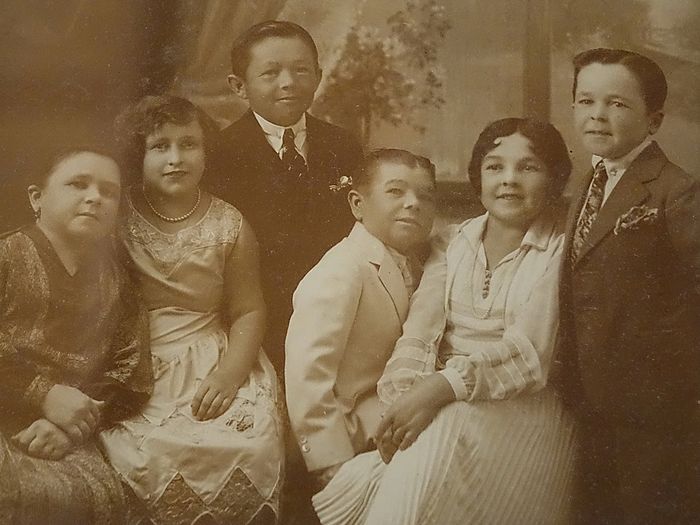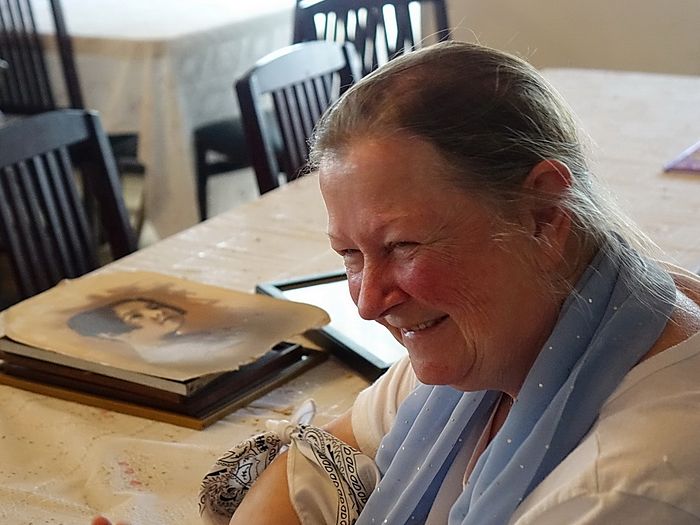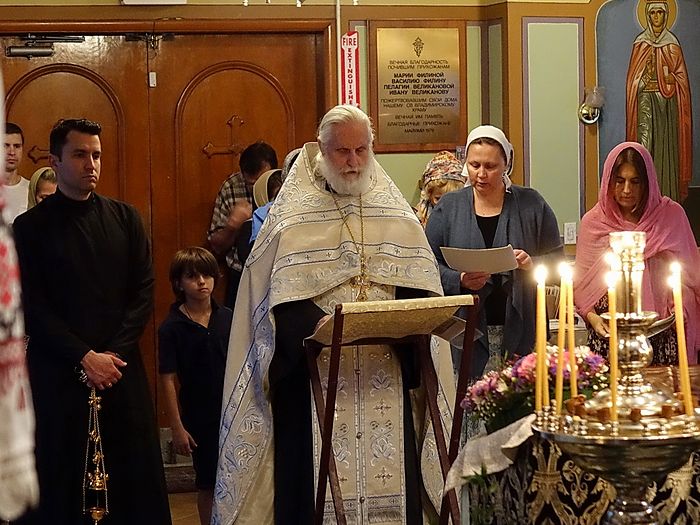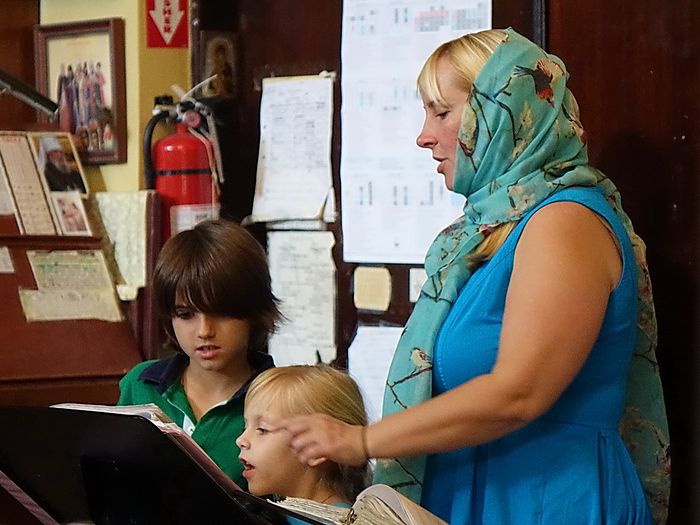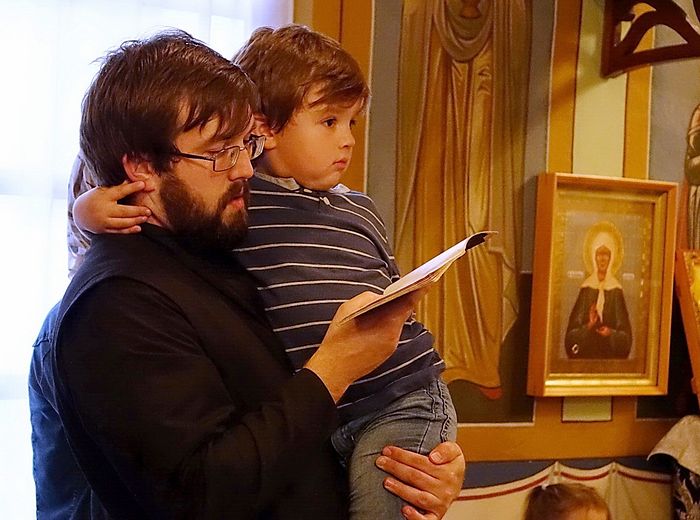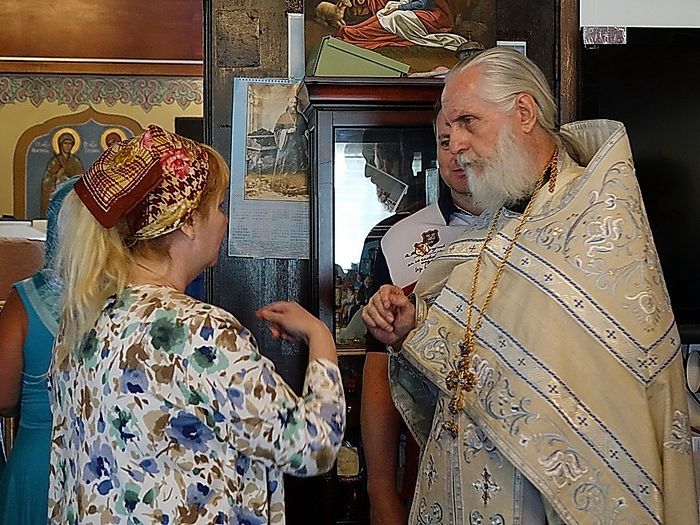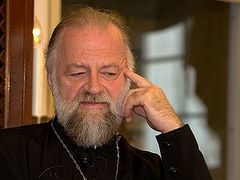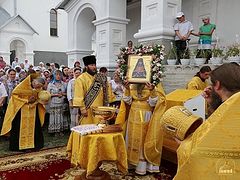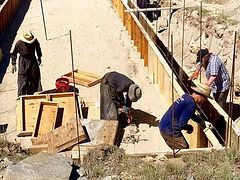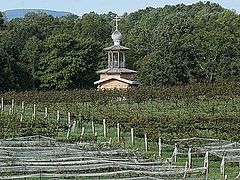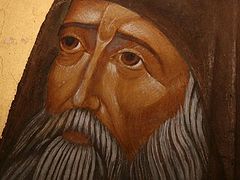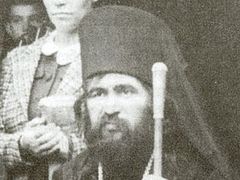There was a group of seven dwarf actors, and the irony was that the surname of one couple—Ivan and Pelagia—was Velikanov [meaning “giant” in Russian]. Now all these little actors are commemorated on a memorial plaque at the entrance to the St. Vladimir’s Church, Miami (Fla).
This was our church
The professional midget actors ended up in Miami after the beginning of the Second World War, and the construction of the first Russian church in Florida commenced in the mid-1940s. The church was founded by representatives of the first and second waves of emigration along with the mentioned little people, including the Velikanov family and Vasily and Maria Filin. Exactly seventy years ago, in November 1947, the temple was consecrated in honor of the Holy Equal-to-the-Apostles Prince Vladimir. Its first rector was Archpriest Theodore Raevsky (future Archbishop Sava (Raevsky) of Sydney; 1892-1976) who together with his wife Persida did much to organize the parish, arranged the church life and laid out a park beside it. The “little” parishioners assisted the priest by serving in the altar, and they sang and read in the choir.
The last dwarf actors worked in the parish till the late eighties. Before their death they bequeathed their two houses to the parish in order to support the church and the priest’s family.
When in the late 1980s the temple was on the verge of closing, it was saved by a family with seven children. The father of the family is a Scottish (and partly Irish) American and an ex-Catholic, and the mother is half French, half Russian and a descendant of the princes Shakhovskoy. They came to Miami from Jordanville, but the St. Vladimir’s Church was like home for them: Sophia was its permanent parishioner from her early youth, and Kenneth McKenzie (who became Father Daniel) discovered the Orthodox faith here.
An American who had learned Russian, in 1989 Fr. Daniel McKenzie became the rector of the Russian church and he has given spiritual guidance to the Russian Orthodox flock for about thirty years since then. Sophia McKenzie (nee Ustinova) relates:
—It was in Jordanville (NY). Metropolitan Hilarion (Kapral), the current First Hierarch of the ROCOR, was then an archimandrite and the dean of theological seminary at Holy Trinity Monastery. Once he came up to Fr. Daniel and invited him to study at the seminary. And when he graduated from the seminary we began to look for a parish. By that time we already had six children. In 1989 we moved to Miami. The St. Vladimir’s Church was on the verge of closing. Russian emigrants were dying out, and the new wave of emigration had not begun by then. It was the church where we felt at home, we had attended it since 1972, and we were very disappointed.
Thus we came for an evening service there, and the atmosphere was so cozy. Fr. Daniel saw the actress Manya [a diminutive form of the name Mary/Maria in Russian] standing on tiptoe and reading in the choir. It looked so moving! At that time the parishioners were mainly emigrants of the first two waves who loved the church very much. It was thanks to those elderly emigres that Fr. Daniel—an American—came to love Russian people and the New Martyrs and Confessors of Russia. He has been serving Russian people all his life and he always tries to help every individual person to find the path to God.
The church council imposed the following condition: we were supposed to sing in the choir and work in the garden. But that was convenient for all of us: I kept the kids in the choir; while the girls sang, the boys looked after the garden, and were responsible for church maintenance.
From that day, father changed radically
—Sophia, have you been in the Church since childhood?
—Yes, since childhood. And such a great saint as St. John of Shanghai was present in my life. And not only mine—in the life of all our family.
My ancestors were from Russia. In 1919, my grandfather, Nikolai Mikhailovich Ustinov, and grandmother Maria (born Princess Shakhovskoy), in danger of death with the help of their servants secretly left their estate in Penza and ended up in the south of France.
At first they borrowed money from banks and the French willingly lent them money hoping that Russia would be freed from the Communist yoke soon. But when it became clear that the Bolsheviks had taken power for a long time, the banks refused to give them more money and so my grandparents literally had to struggle for survival.
It was in the south of France that my father—Alexei Nikolaevich Ustinov—was born. He went to a military school in Versailles and after that he attended a technical school. After the Second World War he met my mother, a French Catholic. They got married in Church and began an ordinary secular Parisian life, not worrying about spiritual things. But my dad, accustomed to church services from his childhood, nevertheless occasionally attended Russian Orthodox and Roman Catholic churches.
One evening he was praying during the Vigil service, which was celebrated by Bishop John (Maximovich). When the congregation was going to leave, the bishop called my dad up to him and asked to stay and help him.
After the Vigil both the saint and my dad went to the altar to put its furnishings in order, and then St. John invited dad to his cell where they talked until two at night.
—He spoke with him just as the Savior spoke with Nicodemus…
—Yes, he did. And from that day father changed radically. Even his wife noticed the positive changes in him and she encouraged his meetings with Bishop John. For my dad, that was a blessed period.
Soon the family moved to Canada where I was born, and later emigrated to the USA where St. John came to serve also. First we settled in New York City, but four years later moved to Sea Cliff, NY. At that time St. John, then already Archbishop of San Francisco, started to attend meetings of the ROCOR Holy Synod in New York City, and he would ask my dad to drive him to the Holy Trinity Monastery in Jordanville. Archbishop John, Archbishop Leonty (Filippovich) of Chile and Archbishop Averky (Taushev) of Syracuse and the Holy Trinity Monastery liked to spend time there.
Dad would often take me with him, so I would sit for four hours alongside the hierarchs on their journey to the monastery. They would talk, and I would listen to them; and though I could understand nothing, the great impression of those trips remained with me forever.
When I turned seventeen, father was transferred to another place of work, in Florida; thus our whole family ended up in Miami. There was the Church of St. Vladimir there. It was the time of the Vietnam War, so all Russians were considered “enemies”. All young men stopped communicating with me as soon as they heard my surname—Ustinova.
I entered a university. One day I was approached by one handsome young man. He greeted me. I thought to myself: “Now he will learn that my name is Sophia Ustinova and will immediately go away.” So I was prepared. But he said that all Russians were in captivity in the USSR. Once I replied that some of them nevertheless did flee from Russia, he looked at me as if I were some “peculiar thing”. Then I proceeded to tell him that Russian people believed in God and that they had been Christians for 1,000 years.
The young man graduated from his university majoring in biology. He studied different faiths, but Orthodoxy was never taught to them at any course. He was disappointed with Roman Catholicism, had not attended church for ten years, and he did not believe that some other Church could exist.
The young man took a keen interest in the Russian Orthodox Church, and I began to tell him about Orthodoxy. We went to the library and I showed him texts in the encyclopedia. He was eager to learn more, so he asked my father numerous questions, and several months later embraced Orthodoxy. In 1972 we were married in church.
When we already had four children, we moved to Jordanville, from where Fr. Daniel was finally transferred to Miami as a priest.
Now our grandchildren sing in the choir
—How did the parish’s membership change after your arrival?
—In the early 1990s, following the collapse of the Communist regime in Russia, Russians from the former USSR started emigrating to Miami in large numbers. Some literally fled from the Soviet Union: They jumped off their ships and swam to the shore. There were ballet dancers among them. Batiushka turned no one down: we would accommodate them in the garage, give them food as long as they searched for jobs. Next Russian businessmen started flocking to Florida.
Many Russians who settled down in South Florida did not forget the faith of their ancestors and were baptized, got married in church and made our parish much stronger. Today most of our parishioners are newcomers. They have “filled” our church, the sisterhood, and the Russian Sunday school.
—Can you tell us about your parish? How do you see its future?
—From 1947 on it was the only Russian parish in Miami until the parish of Blessed Matrona of Moscow was founded in 2011 and the cathedral consecrated in December of 2015.
Our community is a quiet and intelligent one. The temple is filled with the atmosphere of prayer. We have an icon of the Greatmartyr Panteleimon with a tiny portion of his relics from Mt. Athos, the ancient “The Healer of Sorrows” and Kazan icons of the Mother of God. Unfortunately, other old icons had been stolen from our church not long before our arrival and they were never found.
The future of our parish largely depends on the Russian school. There are three groups at our school: toddlers aged three to five, children from six to fourteen, and a group of our pupils’ parents. This makes our school a “family” school. We have lessons every Saturday from three in the afternoon till seven in the evening.
We try to see that our children sing in the choir at least for half an hour after school. In the north of the USA, children seldom sing in church choirs. And our kids learned to sing carols on Christmas Eve and perform monastic chants when we still lived in Jordanville.
With time we decided to invite our parishioners’ children to sing in our choir. Now our grandchildren sing in the choir. Therefore, our parish choir should have a good future!
A mission in Haiti
—Sophia, can you tell us about your and Fr. Daniel’s cooperation with the mission in Haiti?
—Some twenty years ago, Orthodox believers in Haiti appealed to Metropolitan Laurus with the request to establish a mission there. After the restoration of the canonical communion between the ROCOR and the Moscow Patriarchate ten years ago, a ROCOR priest who headed the mission refused to serve. At that time two Haitian priests did not choose to go into schism and asked Metropolitan Hilarion to appoint a new administrator. The metropolitan asked Fr. Daniel to become the new administrator of the parishes in Haiti. It was found that we had no priest who could speak French, but since I speak French, English and Russian I had to travel to Haiti with Fr. Daniel as an interpreter.
The Haitian mission consists of over 3,000 Orthodox believers and four priests. Living conditions in that country are very poor. Despite the hot weather and high humidity in Haiti churches have no air conditioners. When we came there for the ordination of fourteen readers all the clergymen in the altar become wet with sweat. Their phelonia (priestly vestments) were soaking wet and they felt a ringing in their ears because of the heat—I had not seen anything like this before!
Due to frequent hurricanes, Haitians use portable iconostases in the buildings adapted to function as their churches. And now a real Church in honor of St. John of Shanghai and San Francisco is under construction in this country.
We made regular visits to Haiti until the local clergy established their own administrative board. Now we rarely go there and have more time to collect funds for the mission. Haiti residents are so impoverished that it is hard for us to imagine this!
Up to eighty per cent of Haitians live under the national poverty line. Life in the country is very expensive. The majority of the population lives on less than US $2 per day. It is very difficult to find employment in Haiti even if you have several degrees. Every day people come to church seeking aid: They ask for food, for money to pay for their medicines or their children’s tuition.
Like our mission in Miami, the Haitian mission focuses on children’s education, especially of children from poor families and disabled children—Orthodox and non-Orthodox alike. Seven schools were opened at Haitian churches, and that is already a great achievement.
In addition, twenty years ago Fr. Daniel initiated a mission in Costa Rica. Again it was done with the help of our St. Vladimir’s parish in Miami and the support of bishops and individual donors from Russia. Our parishioners raised funds to build an Orthodox church in Costa Rica. Now the church is completed and services are held there.
Thus our St. Vladimir’s Church became a missionary center in the south of the USA.
—Who are the parishioners of the St. Vladimir’s Church today?
—Most of them are married people with small children. Some time ago my daughter’s friend, who devotes most of her time and energy to her studies and job, said that without a baby in her arms she felt like a total outsider there!
We have so many toys around the church that grass doesn’t grow there any more. But the most essential thing is that our children should grow in the Orthodox faith and remain in the Church.

